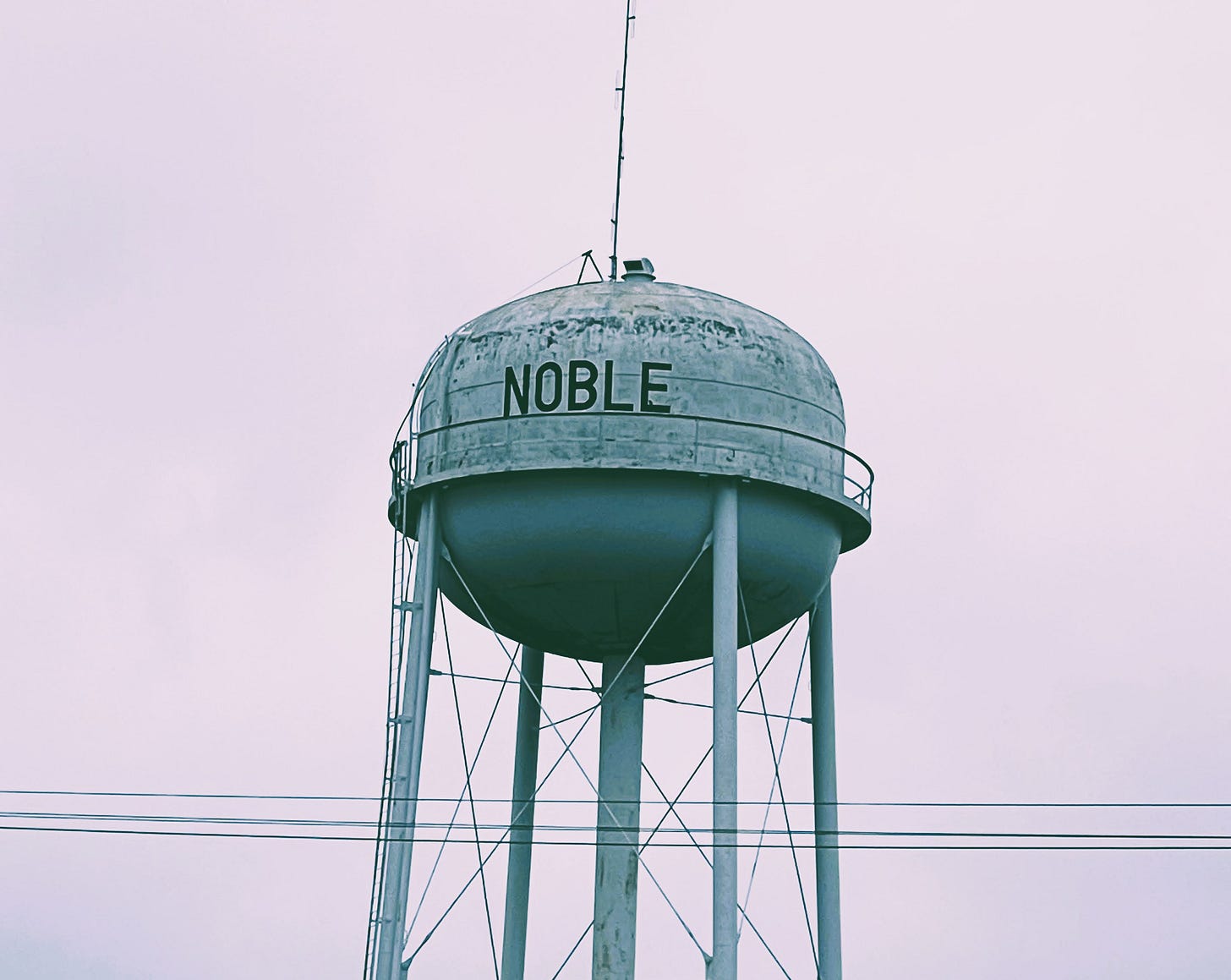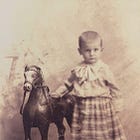A Boy Named Virgil, Part 5: The Smokehouse, Firemen Festivities and the Cat and the Casket
Tales from a Small Village in Southern Illinois Circa 1900
A Boy Named Virgil is the first-person account of Virgil Bravard Browne, based on a letter he wrote to his niece, Marcia Moore Sagebiel, in 1958. The story is edited and read by me, his grandnephew. Read the introduction.
The Smokehouse
Located a few feet from our back porch was the smokehouse for processing hogs butchered in the winter. It was a wooden building with a cellar beneath. A long counter or bench occupied one side of the smokehouse, and in the back was a huge wooden box, in which the hams, shoulders and sides of bacon were salted down to go through a “sweat” before smoking.
The smoking was done by hanging the pieces of meat on the joists using binder twine. A fire of sawdust and chips gathered from the wood yard was ignited. The smokehouse entry and cellar doors were tightly closed.
The fire was built in one of the three-legged iron kettles, perched on bricks to lessen the ever-present danger of fire. It was a major disaster when one’s smokehouse caught fire, for it was not only the loss of the building but also of your year’s supply of meat. And if the smokehouse was near your residence, it possibly could go as well since there were no fire departments worthy of note then.
I recall there was a walking beam pump mounted on a framework with a tongue by which to haul it, with wire wheels some six feet in diameter and a hose cart of like description with possibly a hundred feet of very old and rotten cotton hose on a reel, which leaked like the “lawn soaker” hose we use on our lawns. The average well was shallow, and it was only a short time until it was pumped dry, at which point all one could do was draw back to a safe distance and watch it burn.
Firemen Festivities
At times the small-town volunteer firemen would have a meet that included hose-car races during which the spectators would madly cheer their home team. There also were other contests, and the day’s festivities would end with an outdoor supper, the food being brought by the firemen and their friends.
There was a keg or so of beer, and there always were some who overestimated their capacity of the foaming brew and became what in that day was known as “high.” They would have to be helped to their buggy or surrey to be taken home, and no doubt soundly berated by their wives.
It was a robust age and an uncomplicated one in comparison with that of today. Each small town had one or two town drunkards, which caused their families to want for the necessities of life. Nonetheless, most residents were pretty good citizens, few wealthy and few poor, but good neighbors and at your side when you were in need.
In the case of death, no deceased person lacked mourners to attend the last rites, no matter how poor they were, and many followed to the cemetery when the body was laid to rest.
The ladies cooked food and brought it to the home so the survivors would have something good to eat and not have to think about providing a meal for visitors.
The Cat and the Casket
It was a custom of that time for a few friends to sit up with the deceased at his or her home, and what a tiresome task it was. It was almost impossible to stay awake. I recall one time, though, when there was an incident that broke the monotony.
It had long been known that a dead person was a fascination for cats.
Why? I don't know, but I was sitting up with some other people with an uncle of a friend of mine. I was in my late teens.
It was about one o’clock in the morning and cats had been prowling around the house most of the night. The doors were open, as it was a hot Illinois summer night — and the screens which were old but of course closed — when out of the dark a big black Tom cat showed at the screen and started clawing it. A corner of it gave way and in he came and jumped on top of the casket. He then let out the most eerie yowl I had ever heard.
I admit that the hair on the back of my neck rose, and a cold shiver ran down my spine. The other four people and I beat a hasty retreat into the kitchen. We got an old scrub broom from a corner and while one of the men held the screen door open, I swatted the cat with the broom, knocking it to the floor, and before it could orient itself, I pushed it outdoors with the broom and the other man slammed the door.
It was hot with the door closed, but that was better than having cats in the house.
The cat’s claws made three torn places in the cloth of the casket, which we repaired with flour paste and shoe polish. That was the only time I ever helped repair a casket.
Your father will remember the people. They were Fred and Sadie Goodwin, who at one time operated a restaurant in Noble.
Next time: Meeting Places, Moving Pictures and Live Dramas
Thank you for reading. If you liked this slice of FRIED BOLOGNA, please click the 🤍. Access the archives.










This is one of the many points in favor of horses as mode of transportation. If their owner got into the buggy drunk, more often than not the horses knew the way home. And barring anything spooking them on the road, no one got hurt.